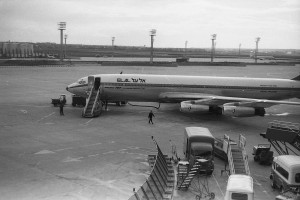by Alan Trabue
Chapter 1: Ready Aim…. Part 2
I watched another soldier approach to assist the screaming soldier who seemed ready to shoot me. The two spoke excitedly. The second soldier started poking around the contents of my opened polygraph instrument. Chains, tubing, cuffs, finger plates, and ink bottles—it was a playground for a curious mind. He flipped switches and turned knobs. What an incredibly stupid thing to do if the instrument had actually been a bomb.
Part 1 of Life of a CIA Polygrapher begins here.
In the best nonchalant manner I could muster under the circumstances, I smiled and said, “It’s for a doctor. It’s medical equipment.”
My explanation might have fooled them if they understood English. The second soldier called for help. Both pointed their guns at my chest while they waited for help to arrive. Only a table-width away from me, one of those weapons could have cut me in two in an instant. A third soldier approached. Now, two of them poked around the strange-looking contents they had discovered. The first soldier nervously kept his gun aimed straight at me. He was the one that worried me the most.
Still barely able to take my eyes off the menacing submachine guns, in a calm, yet emphatic tone I said once again, “It’s for a doctor. It’s medical equipment.”
It was obvious from their puzzled looks and frightened demeanor, they didn’t understand me. Talking back and forth at length, their discussion seemed to turn into an argument. It appeared there was disagreement among the three soldiers about what to do. It must have been their first experience dealing with a mad, American bomber. Their discussion grew loud, high pitched, and agitated. They gestured wildly with their arms and weapons. I didn’t understand a word they said, but their demeanor was very threatening. I hoped their argument was not over whether to shoot me or arrest me.

A submachine gun was pointed at me at all times. Eventually, one of them motioned for me to hand over the passport in my hand. After what seemed like an eternity, the guns were pointed away from me, my passport was returned, and they finally motioned for me to board the plane. I packed up the equipment in record time and walked across the tarmac to the waiting airplane. My encounter with the soldiers had delayed its departure. Flight personnel standing at the airplane’s door stared at me as I walked up the steps. Passengers glared at me through the windows. As I boarded the airplane and walked down the aisle to my seat, all eyes were on me. I was the center of attention and the object of much whispered speculation. Beads of sweat on my forehead were not caused by the heat. The airplane door was still open. The soldiers could change their minds, rush the airplane, and drag me out. It seemed to take the flight crew forever to prepare for takeoff. They walked slowly down the aisle checking passengers’ seatbelts. I kept looking out the window for soldiers running onto the tarmac. Mercifully, the door was finally closed and locked, and the plane began pulling away from the terminal.
After takeoff, most of the passengers stopped staring at me. As the plane continued to climb, I reflected on the terrifying incident. I couldn’t get it out of my mind. I thought of my wife and daughter thousands of miles away. I was alone and on my own. A tall, light-skinned foreigner, I stood out like a sore thumb. And I was carrying around a briefcase with contents that looked like a bomb. I wondered how I got myself into this mess. What was it about covert ops? Was it the adrenaline rush from interrogating liars or the challenge of operating clandestinely in hostile environments? With arrest and imprisonment always just around the corner, why would I choose to be a globe-trotting polygraph interrogator for the CIA?
A second generation CIA officer, Alan B. Trabue spent his youth in Uruguay, Japan, and Saipan. He traveled extensively in Central America, South America, the Far East, Southeast Asia and Europe interrogating foreign spies. For five years, he directed the CIA’s world-wide covert ops polygraph program. He served as Director of the CIA Polygraph School for six years and as an adjunct instructor at the current federal polygraph school for eight years. He is also the author of A Life of Lies and Spies: Tales of a CIA Covert Ops Polygraph Interrogator
“For a cumulative record of service which reflected exceptional achievements that substantially contributed to the mission of the Agency,” Mr. Trabue received the Career Intelligence Medal as a CIA Polygrapher.
